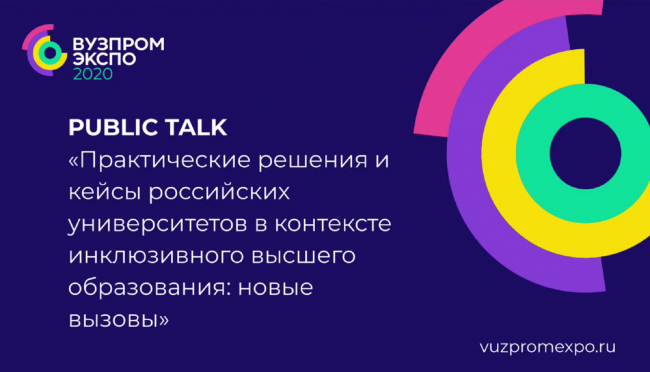The 7th annual national exhibition VUZPROMEXPO is being held in Moscow, at the "Expocentre", organized by the Ministry of Science and Higher Education of the Russian Federation.
On December 10, at one of the platforms, a discussion of practical solutions and a presentation of cases from Russian universities in the context of inclusive higher education took place. The participants of the event, held in a combined - both offline and online - format, were representatives of the Department for the coordination of the activities of educational institutions of higher education of the Ministry of Education and Science of the Russian Federation, resource educational and methodological centers for training people with disabilities and persons with disabilities of the country's leading universities.
One of the most successful was the case "VR-technologies in teaching students with disabilities" RUMC VyatSU, presented by the vice-rector for strategic development and project activities of the university Konstantin Bazhin. Possessing exceptional opportunities to ensure high quality and real accessibility of higher education for persons with disabilities, VR technologies acquire particular importance in teaching students with musculoskeletal disorders. With that, the speaker stated, a wide range of objective difficulties are being overcome; adaptation, rehabilitation, compensatory tasks of special education are being implemented.
Until recently, Konstantin Sergeevich noted, applicants with musculoskeletal disorders practically did not choose the direction of training "Engineering, technology, technical sciences." Today the number of such students in the RUMC VyatSU group has doubled. This became possible thanks to a case created here together with partners, based on the use of virtual reality technologies - now those who are interested can master previously inaccessible disciplines of professional training.
Konstantin Bazhin spoke about educational simulators developed using VR technologies that provide comprehensive psychological and physical rehabilitation for a student with a disability. The adaptive discipline "Life Safety" is a good example of such a simulator that allows you to completely replace the student's learning activities in various technogenic conditions. As a result, a student with a disability can freely "move" in real space, have access to any objects of industrial infrastructure, and master the skills of using technical equipment without any problems.
The offered case is quite affordable today, does not require unreasonable expenses. This also applies to the cost of a set of equipment, and the cost of developing a fully functioning course, - emphasized Konstantin Bazhin.
In addition, he emphasized the need to present appropriate requirements for the preparation of a course instructor using VR technologies. In addition to mastering psychological and pedagogical competencies for working with persons with disabilities, such a specialist must have the skills to work with multimedia equipment.
Concluding his speech, a representative of the largest university in the Kirov region drew attention to an aspect that should be taken into account when developing any educational online courses. We are talking about the requirement for their adaptation for teaching students with disabilities as mandatory for the developer - in the future, this will allow you to immediately use new courses in an inclusive environment, saving resources for revision. Konstantin Bazhin also made a proposal to pay attention to improving teaching methods not only in the main programs, but also in additional ones.
Students with special needs are in great need of such programs, - Konstantin Bazhin expressed confidence.
Read in Russian
Online newspaper

Vyatka State University presented a promising case in the field of inclusive higher education at VUZPROMEXPO-2020
- 14 December 2020, 08:14
- Author: admin
- Views 1590
The development of RUMC VyatSU specialists is based on the use of VR technologies in teaching students with disabilities
